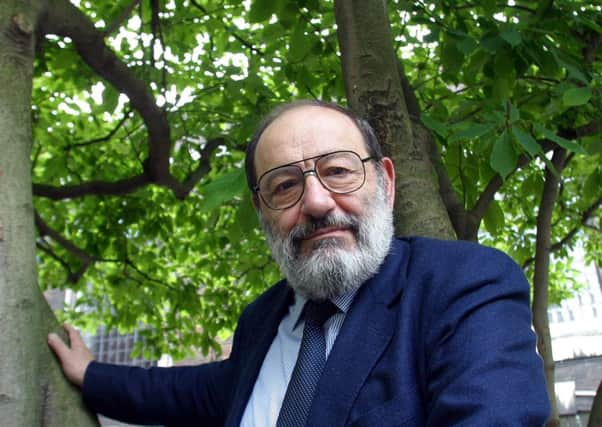Literary labyrinth master Umberto Eco dies at 84


The novelist, essayist, literary critic, philosopher, and semiotician was 84. He had been suffering from cancer.
Author of a wide range of books, Eco was fascinated with the obscure and the mundane, and his books were both engaging narratives and philosophical and intellectual exercises. As a semiotician, he studied what we can learn about a culture from its signs and symbols, icons, musical scores and even the technical languages of the internet.
Advertisement
Hide AdAdvertisement
Hide AdThe Name Of The Rose transformed him from an academic to literary celebrity, especially after the medieval thriller set in a monastery was made into a film starring Sean Connery in 1986. The novel sold millions of copies, a remarkable feat for a narrative filled with partially translated Latin quotes and puzzling musings on the nature of symbols. But Eco talked about his inspiration with characteristic irony: “I began writing… prodded by a seminal idea: I felt like poisoning a monk.”
His second novel, the 1988 Foucault’s Pendulum, a byzantine tale of plotting publishers and secret sects also styled as a thriller, was successful, too – though it was so complicated that an annotated guide accompanied it to help the reader follow the plot.
In 2000, when awarding Eco Spain’s prestigious Prince of Asturias Prize, the jury praised his works for their “universal distribution and profound effect”, adding that they were already classics in contemporary thought.”
Eco was born on 5 January 1932 in Alessandria, an industrial town east of Turin; he said the reserved culture there was a source for his “world vision: scepticism and aversion to rhetoric”. He studied philosophy at Turin and began his fascination with the Middle Ages and the aesthetics of text.
He had always loved storytelling and as a teenager wrote comic books and fantasy novels. “I was a perfectionist and wanted to make them look as though they had been printed, so I wrote them in capital letters and made up title pages, summaries, illustrations,” he told the Paris Review in 1988. “It was so tiring that I never finished any of them. I was at that time a great writer of unaccomplished masterpieces.”
Eco remained involved with academia, becoming the first professor of semiotics at the University of Bologna, Europe’s oldest university, in 1971. He lectured worldwide – he could do so in five languages – and was a fellow at Oxford and Columbia. Thirty-four universities awarded him honorary degrees.
But Eco was also able to bridge the gap between popular and intellectual culture, writing columns in daily newspapers and Italy’s leading weekly magazine L’Espresso.
Advertisement
Hide AdAdvertisement
Hide AdEco started in journalism in the 1950s, working for the Italian state-owned television RAI. From the 1960s onwards, he wrote columns for several Italian dailies. He also wrote children’s books, including The Bomb And The General (La Bomba e il Generale).
In 1980, he hit the literary jackpot at the first attempt with The Name of the Rose. Set in a 14th-century Italian monastery where monks are being murdered by others determined to keep Aristotle’s long-lost treatise on comedy, it intrigued a mass audience despite occasional philosophical complexities.
Subsequent novels — with protagonists like a clairvoyant crusader, a shipwrecked adventurer in the 1600s and a 19th-century physicist — also demanded that readers absorb heavy doses of semiotics along with compelling fictional tales.
His most recent novel, Numero Zero, came out last year and recalled a political scandal from the 1990s that helped lead to Berlusconi’s rise.
In a 2011 interview, Eco shrugged off critics who found him “too erudite and philosophical, too difficult,” saying he wrote “for masochists.” “It’s only publishers and some journalists who believe that people want simple things,” Eco said. “People are tired of simple things. They want to be challenged.”
He also explained how someone as “strongly anti-intellectual” as Berlusconi could become a political force in Italy, a cradle of Renaissance culture. “Italy is not an intellectual country. On the subway in Tokyo everybody reads. In Italy, they don’t. Don’t evaluate Italy from the fact that it produced Raphael and Michelangelo.”